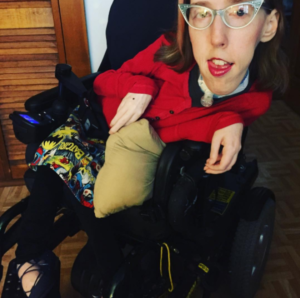Clik here to view.

Erin Hawley
After reading Ellen’s post on the Love That Max blog about her son Max’s declaration that he does not have “special needs,” I thought about my journey with identification and how it changed over the years.
Growing up in the 80s and early 90s, I never even considered myself disabled. I knew I was different, but to me, disability was something those other kids on TV had – the kids on telethons wishing for another body or being isolated from friends and family. That wasn’t me at all. My family loved, accepted, and cared for me. I had a large circle of friends at school that I hung out with regularly, and they treated me as an equal peer. At the time, I didn’t realize the privileges that led to live that sort of life. So I disregarded any attempt to categorize me as something I only associated with pity and sadness.
Media skewed my view of disability, and those stereotypes were difficult to unlearn. In high school, I began to see that disability is not about shame. Through talking with other crips (a term we have reclaimed), and being involved in the disability community thanks to the internet, I now envision disability as something powerful. No longer do I skirt the term “disabled,” but I wear it proudly like a badge of honor. When I have bad days that test my resolve, that threaten to dislocate me from the comfort of my own skin, I turn again to my fellow disabled friends and partner for support. We hold each other up — not always perfectly, but enough to keep going. We see this support and proud declaration of disability across the United States now, in protests against Medicaid cuts. Crips are spectacular and beautiful and prevailing.
Like Max, I think the term “special needs” doesn’t fit us. Kudos to Ellen for recognizing her son’s wishes, and respecting his desire to avoid that term. I’m in my mid-thirties, so I’ve come a long way since elementary school or middle school, where that term was used frequently. When I think of disabled people, the community Max and I both belong to, I don’t see our needs as special. They are normal, the same as abled people’s needs. We all have to eat, sleep, toilet, have social lives, and receive healthcare. Disabled people may go about these things in unique ways, but the core need is all the same; the difference is that the government or other systems routinely exclude us and cut services we desperately need. So we keep fighting.
It took me a while to accept my definition of disabled. It took me a while to understand why “special needs” and “person with a disability” bothered me. Max is also exploring these terms, figuring out how to define himself, and I think that’s a great thing to do. It’s also difficult, and I imagine his feelings will change as time goes on — just like it has for me. I accept that my opinion on terminology will evolve again; the learning and growing process does not end, nor should it. But, regardless of what I choose, I will always be proud to be me.
Join Easterseals National and Easterseals Thrive on July 20th at 7pm EST for a live Twitter chat on disability pride! Learn more at our website.
